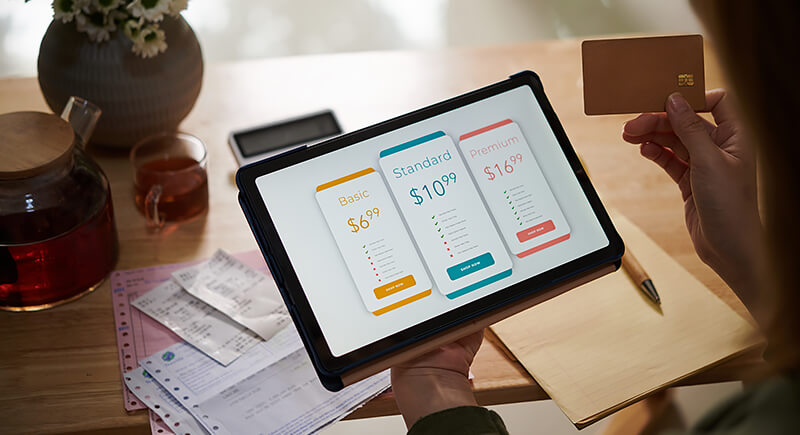Using cash might seem smart, but in some cases, you need to think twice. Some purchases with paper money could cause you to lose protection, miss out on perks, or create unnecessary problems. From travel to taxes, here are a few things that are better paid another way.
Electronics

Credit: iStockphoto
When you pay cash for phones, laptops, or TVs, you often give up purchase protection and warranty extensions. Credit cards can cover damage or theft beyond the store’s return policy. If something goes wrong, there’s little recourse without a clear payment trail.
Flights

Credit: iStockphoto
Most airlines don’t accept cash for bookings. Even if they did, cash payments don’t qualify for credit card travel perks like trip insurance, points, or fraud protection. It’s also harder to track expenses or get a refund if plans change.
Rental Cars

Credit: iStockphoto
Rental agencies usually require a credit card to reserve a vehicle. Some won’t accept cash at all. Others demand a large deposit and extra documentation. Using a card includes collision coverage, which cash obviously doesn’t.
Hotel Bookings

Credit: iStockphoto
Hotels tend to need a card on file for reservations and incidental charges. Using cash for such transactions may result in a denied booking or a large deposit. You’ll also lose out on rewards programs and protections if the hotel overcharges or cancels.
Online Purchases

Credit: freepik
Cash can’t be used online, and even debit cards offer less protection than credit cards. If the item never arrives or turns out to be a scam, a credit card dispute can help you get your money back. With cash, there’s no backup.
Concert or Event Tickets

Credit: iStockphoto
Buying tickets in cash, especially from resellers, can be risky. If the ticket is fake or canceled, you’re stuck. Making payments with a card provides a record and may let you recover the funds if something goes wrong.
Furniture or Appliances

Credit: freepik
There are numerous stores that offer financing or discounts for cardholders. But the same option is not available when using paper money. Plus, if there’s a delivery issue or a defective item, it’s harder to make a claim or prove a purchase without a digital receipt.
Jewelry

Credit: freepik
Expensive jewelry purchases should always come with a verifiable trail. Paying in cash makes it difficult to insure or return the item. It may also raise concerns at the store or during appraisals. Use a traceable method instead.
Tuition Payments

Credit: iStockphoto
While some colleges allow paying with cash, most prefer checks or online portals. Paying tuition in cash can delay processing and create tax issues later. Digital methods also generate records for financial aid and education credits.
Medical Bills

Credit: freepik
Hospitals and clinics do take cash, but it complicates reimbursement if you have insurance or a health savings account. Without a digital receipt, it’s harder to track expenses, dispute errors, or claim deductions during tax season.
Business Expenses

Credit: iStockphoto
Cash makes bookkeeping messy. If you’re self-employed or run a business, using cards or checks helps track spending, prove expenses during audits, and separate business from personal costs. Cash does not leave a paper trail that you may need for records.
Donations

Credit: iStockphoto
Most charities can’t issue a tax-deductible receipt without a name and traceable donation. Cash donations are easy to lose track of. If you want to claim a deduction or show support for a cause, pay by card or check.
Travel Bookings

Credit: iStockphoto
Tours, cruises, and vacation packages offer protections or perks when booked with a card. Travel insurance, cancellation coverage, and fraud protection may come built-in. But you will be left without a backup if you choose to opt for cash.
Monthly Subscriptions

Credit: iStockphoto
Streaming services, gym memberships, and software plans require auto-renewal—cash can’t do that. Debit cards may work, but credit cards are often more secure. Plus, you’ll avoid service interruptions or late fees due to missed deadlines.
Home Repairs

Credit: iStockphoto
If a contractor insists on cash, that’s a red flag. You lose proof of payment, and there’s no way to dispute poor work. Many states require written contracts for larger jobs, and digital payments help enforce them.
Car Down Payments

Credit: iStockphoto
Some dealers accept cash, but large amounts can raise IRS reporting requirements. You might also miss financing incentives or rebates linked to certain payment methods. A cashier’s check or wire transfer is more secure and less complicated.
Luxury Goods

Credit: iStockphoto
High-end stores are cautious with cash, especially for large purchases. You could be asked to show your ID or fill out forms. But by swiping your card, you can create a verifiable purchase history, which can help with returns, repairs, or reselling.
Large Electronics Repairs

Credit: iStockphoto
If a repair shop takes your cash and doesn’t fix the issue, you have few options. Paying with a card gives you leverage if the service is incomplete or overpriced. It also helps you track maintenance expenses.
Tax Payments

Credit: iStockphoto
The IRS allows cash tax payments—but only through third-party retailers and with extra steps. You need a payment code, and limits apply. Giving a check or using IRS Direct Pay is faster, easier, and comes with clear proof.
